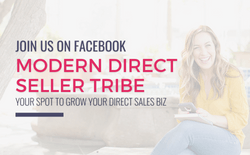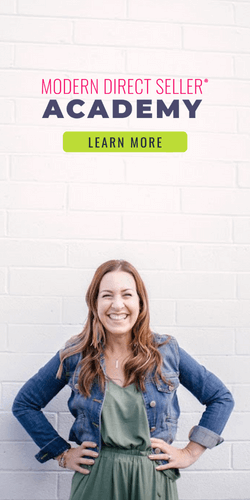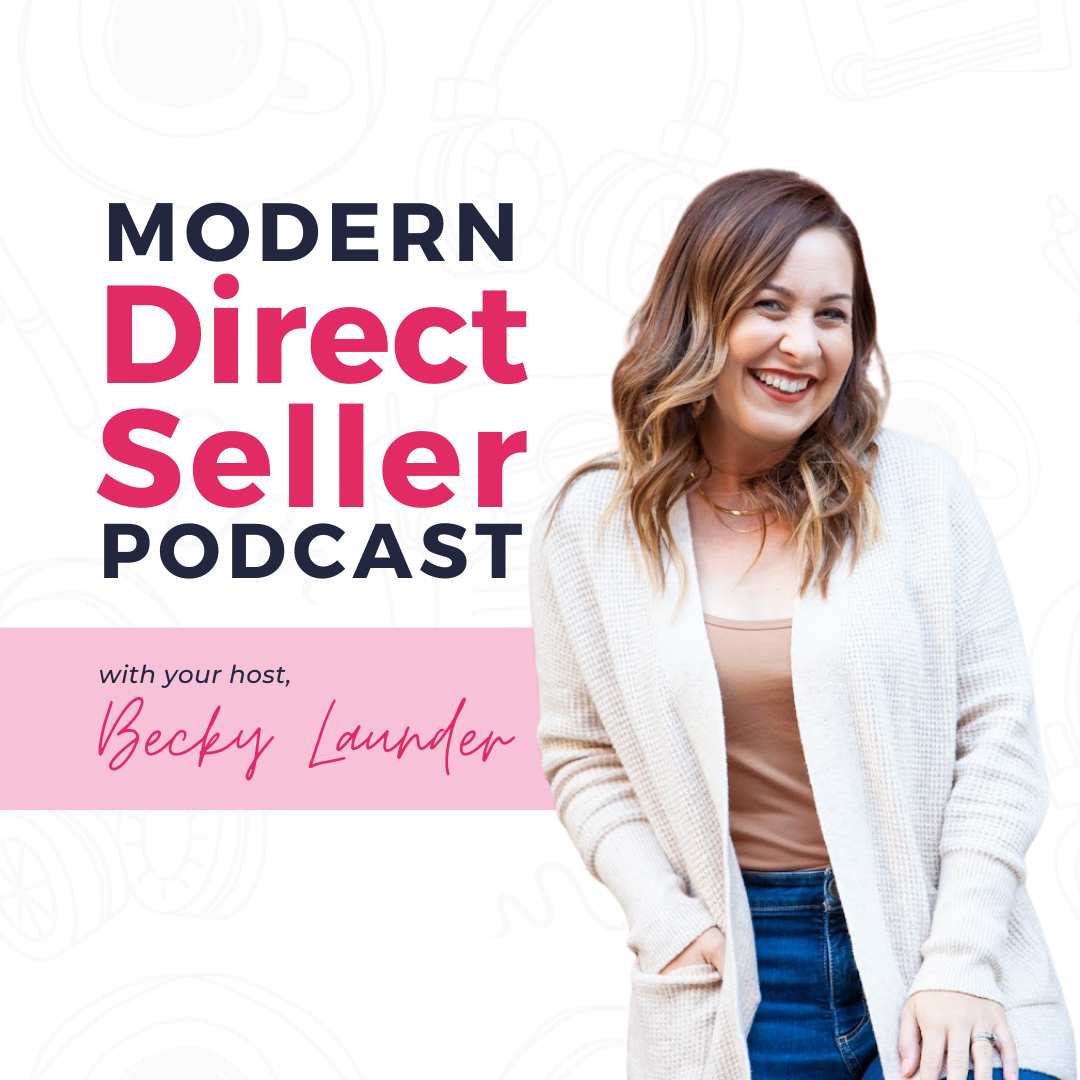This week on the podcast, we were joined by Cindy Monroe. She’s the founder of Thirty-One Gifts, the author of More Than a Bag, and she’s spent 20 years growing her company into one of the biggest direct sales businesses in the industry. Through all of the ups and downs, her business is going strong, she’s kept ahead in a world full of distractions, and she’s stayed invested in meaningful relationships with her teams and with her customers. Today, she’s shared her best tips to help us do the same!
Find Cindy on Facebook, Instagram, Twitter, or LinkedIn, or visit MoreThanABag.com and sign up to get 5 free chapters of her book, plus inspiration to feel more intentional, more motivated, and more empowered to reach your goals in 2023.
Time based notes:
- 1:45 Cindy Monroe introduction
- 3:16 The Thirty-One Gifts journey
- 5:51 More Than a Bag
- 6:52 Create a strong direct sales business
- 9:55 Leadership lessons
- 12:30 How to stay ahead
- 15:02 Connecting with customers
- 22:35 Becoming a successful seller
Stay Ahead of the Direct Sales Industry with Advice from Cindy Monroe
Recently, we were joined on the Modern Direct Seller Podcast by Cindy Monroe, the founder of Thirty-One Gifts, the author of More Than a Bag, and a direct sales leader who’s spent 20 years growing her company into one of the industry’s biggest successes. Through all of the ups and downs, her business is going strong, she’s kept ahead in a world full of distractions, and she’s stayed invested in meaningful relationships with her teams and with her customers. Today, she’s shared her best tips to help us do the same!
Cindy, for those that don’t know you, can you just do a quick little introduction to let us know about your background and what you’re up to?
Well, on a personal note, I love being outside. It doesn’t matter if it’s boating, hiking, skiing, or walking the dogs. I’ve been married for 29 years to my best friend, and we are now empty nesters—which is hard to even believe. And, I started Thirty-One in 2003. I held the very first parties; I held the very first sales meetings in my living room. We shipped orders from our basement in Chattanooga, Tennessee. I kind of wore all the different hats, and I absolutely never imagined that we would grow the business to almost 800 million, and just have the ups and downs and the stories that we’ve had along the way.
And, while that number was never the goal, I think what has been the goal is to pour into so many women starting their own businesses, and to inspire them to reach more of their potential. So, that’s been my passion, and what’s just driven me the whole time.
What a journey! I mean, Thirty-One is like a household name in the direct sales world. And, I’m sure it wasn’t like that from Day One. I know everyone loves the glimpse into the early days, when you were first getting started, or even overcoming some challenges, because it probably wasn’t always a walk in the park. So, will you share a little bit of that journey and that story?
So, I’ve written a book called More Than a Bag, and in it, I’m very vulnerable about how hard it was to start this journey, and then how amazing and rewarding it has been. I mean, there have been so many ups and downs along the way. And, I think that’s in life in general. I think it’s in business. I think it’s in parenting. When it comes to Thirty-One, everybody thinks that it just was success overnight, but it took years to build that business. And then, whenever we did start seeing the success and the growth, year over year, just taking off, it came with a lot of challenges.
I know one of the things that has been so hard in direct sales are back orders, and product availability, and shipping times, and things like that. So to walk through those days, and those end of months, where you would beat plan like 10 times on the last day of the month, or a sale would go bonkers and you’d sell way more than you expect to sell… It doesn’t matter what direct selling company you’ve been with. Those are just challenges and problems that we’ve all faced. And trying to communicate as much as possible to our sales team leaders and distributors and consultants about the details behind those challenges, the “why” behind them, and how we’re going to move forward, has just been a journey the whole time.
But eventually, we started being consistent with new product development and coming out with great product and great training. We developed leaders. And I would say that, those first few years, I was the leader. I was the director. I was the National Executive Director. So, it was really when we started building those leaders, and they started role modeling and leading their team, that the magic and the power really started to happen. And, I don’t think that leaders in the sales fields really understand the influence and the power that they have in a direct sales company.
So, you truly were kind of walking the walk in those early days, out there doing parties, leading teams, really hands-on with the field. And, this has been a 20-year journey for you. So, you’ve seen a lot. From your perspective, if you’re in direct sales right now and you’re thinking, “What do I need to do to be successful?” What do you think are the most important areas to really build a strong direct sales business?
I think that it’s all about being consistent at what you’re good at. I think that some people think that you have to be great at this, or great at that, or you have to have an outgoing personality to be successful, or look a specific way. And, I have seen women from all walks of life, women with every personality type, be successful at Thirty-One. I think that the minute that a seller or leader tries to do what someone else is doing, they begin to lose their mojo a little bit, because they’re not working in their natural strengths and their natural gifts. So, I feel like that that’s one thing that’s super important, is to focus on what you’re good at. And, when your business is at its best, revert back to what you were doing in your business at that time.
I think also having a strong “Why?” is something we talked about from the beginning at Thirty-One. I know there’s books on this idea, but really understanding why you’re doing this is key.
And then, you know, focusing on relationships. I think there’s been a shift from that a little bit. But, I do feel like that if you want to be successful, that really just standing in your strengths, having a strong “Why?”, and focusing on relationships are the best places to spend your energy.
Those relationships are so key. I feel so strongly that that’s what differentiates direct sellers from so many other brands out there. You know people’s birthdays, and you know their kids’ names, and you remind them when they might be interested in purchasing something that you know one of their favorites. And, at its core, you just have to talk to people. You have to get to know people, learn how to best serve them, and build up those relationships in a big way. And, I don’t believe any technology or hack or shortcut can really replace that, so I couldn’t echo that any more.
When it comes to relationships, your direct sales team is also a huge focus, and by leading one of the biggest direct selling companies in North America, you must have learned a lot. From your personal journey, what are some big leadership lessons that you’ve walked away with that you want others to know about, too?
I think one of them would be staying focused on my own goals when everyone else is spiraling with distractions—and our world is full of distractions right now. In direct sales especially, your team can start spiraling with distractions, and your peers can start spiraling with distractions. Whether you call it “Staying in your lane” or “Focusing on your goals and your purpose,” I think that that is one of the number one lessons that I learned as a leader. And, whenever I stay focused on where I’m going, people follow. It’s amazing! People will follow you.
I think, also, it’s so important to communicate often during times of uncertainty. So, if there are back orders, or if there are shipping issues, or if whatever else might happen does happen, you need to communicate often. And, that can come from the home office. But, I think it also can come from the sales field leadership.
The last thing I’ll share—that I’ve personally really had to learn over and over again—is to focus on the things that you’ve done right. I feel like a lot of people struggle with this, but so many times, I’ve felt like a failure. And, instead of using that as a stepping stone to confidently move on to the next challenge, I would let that emotion hold me back. I would let it keep me from moving at all; it would sometimes cause me to take steps backwards. And so, that probably leads into my personal definition of success, which is “Moving one step forward.” And, if I’m moving one step forward, then I know that I’ve not gotten stuck in that emotion of feeling like a failure.
Okay, so this industry continues to evolve every day. It’s changing and growing. And, there’s always a rising trend. So, I know many direct sellers out there are thinking, “Well, what’s next? What are the next 12 months going to bring for my business? Where should I be focusing?” I think it’s a constant struggle to try and stay ahead of what’s coming. So, do you have any thoughts about where the industry is headed over the next couple of years, and tips for sellers that are working to stay ahead?
For sure. So, I think that we’re still having this post-pandemic adjustment. And, just as you were saying before, I really feel like that we’re going to go back to personal connections. I think we have to, because over the last few years, so many of our sellers have shifted to social media or broad communications, which no longer sets us apart from big box stores or online brands. There are so many online brands out there. I get new promotions in my Instagram feed all the time, and they have a bigger advertising budget than us. So, if we’re just trying to match them, then we’re not setting ourselves apart from them. And I think that whenever we broadcast on social media, we immediately broaden our message so that it applies to a large audience. Because when we’re like, “Well, we’re talking to 500 people,” we’re not going to make it super targeted. But, that also tends to make it vanilla.
I think that simply sharing our products has never been our differentiator. It is how we share it. We get to know our customer. Whether it’s knowing their kids’ names, or that they have a dog or a cat, we get to share our products and how our products can meet their specific needs. So, where we shine in direct sales, and what we can get back to this year, is finding our own strengths. We need to decide where we want to show up and how we want to connect with our customers. Some of us love to do it belly to belly; some of us want to do it from our home office. Either way is fine. But, you need to figure out how you’re going to connect, how you’re going to build those relationships with your best customers, and how you can target specific products or solutions for that season of their life. I want to really see the industry and our sellers get back to their own pixie dust, and the things that they can add to their customers’ experiences that sets them apart from the big online brands that are just popping up in their news feed.
I think you’re exactly right in that we’ve gotten in this habit of what I call a “one to many” broadcast, right? Like, you’re talking to many people at the same time, because heck, it seems a lot more efficient to do it that way. But, we put so much of an emphasis on what to post today on social media that I think sometimes we forget that the magic is really in those conversations happening behind the scenes, and that’s what creates some big results. That’s what keeps us competitive and relevant.
And, I think that it’s more rewarding for our sellers. For example, I know that these last few months, companies in our industry have struggled with sponsoring new team members to join their business. But, relationships go two ways; we get something out of it as well. And so, if we’re only broadcasting, and there’s not a two-way relationship or conversation, then we’re not getting what we used to get out of it. If you’re not pouring back into yourself with those conversations, you are missing out as a seller.
And, at the same time, those conversations build confidence in your customers. They want to come back to you; they want to recommend you. If you’re not getting the referrals you used to get, it’s probably because they don’t see your bedside manner, or they don’t see the relationship that maybe they used to see from you or feel from you.
That’s so true. And, I think often, direct sellers have in their head, “If I send them a direct message, I might be kind of annoying people.” Or, “That might kind of turn them off, if I’m checking in with them, or asking questions about their lives,” or whatever. But, I think what I’m hearing from you is that that’s actually just part of what we do in direct sales. And, those customers actually really look forward to hearing from you.
They almost expect it from you. And, they know that they’re supporting your business, and they want to know how you can help them, so if we’re not showing up to help them, then I think it can come back to, “Why do I need to support her versus just going and buying this at Target?” So, there’s an expectation for us to show up for our customers. And, when we meet that expectation, or even exceed it, oh my goodness, she will refer you all day long.
And, just being really intentional about it. I think that that’s the biggest theme here, is making sure that part of your daily routine is connecting with customers. I think sometimes we think we’re connecting, because we’re making that post on social, or we’re sending an automated text, or whatever else thst might be going on in the background of your business. But having real conversations is where it’s at, and I think that that brings us back to the beginning of direct sales. When it started, it was based in home parties, chatting it up, connecting with people. And, I always say that you build that relationship faster in-person.
I feel like, if we go back to the original Avon and Mary Kay days, we have to think about how they were literally going door to door. They were walking out of their car, up the driveway or the sidewalk, knocking on the door… Like, that just blows my mind. But, it worked. And so, I guess my question is, “What’s your doorway? What is your sidewalk? What is your connection with your customers?” Because, we still need that doorway. We still need to connect and want to connect with them, because that is what sets us apart. I think that is the success.
As leaders, we can also fall into the trap of, “Okay, well, now we need to shift to just leading and supporting our team.” And, that is true. But, I think that being a role model is one of the number one ways to lead your team. So, we need to be thinking about how we consistently role model that relationship with our best customers—and I don’t think that everyone is our best customer. We have to identify and be intentional about who are our best customers, and show our teams how to do the same.
Speaking of success, are there any common attributes that you would say really make a direct seller successful?
In the end, I think that being consistent is really important. I think that, like we’ve talked about, building those relationships is key. And then, you just need to make sure that you love what you’re doing, that you love the product, and that you love the mission behind the business. I think that those are the same attributes that we see in our most successful direct sellers.
Connect with Becky and more than over 500 like-minded direct sellers by joining the Academy today at ModernDirectSellerAcademy.com.
Take Action: What’s one way that you can cultivate relationships with your customers?








0 Comments